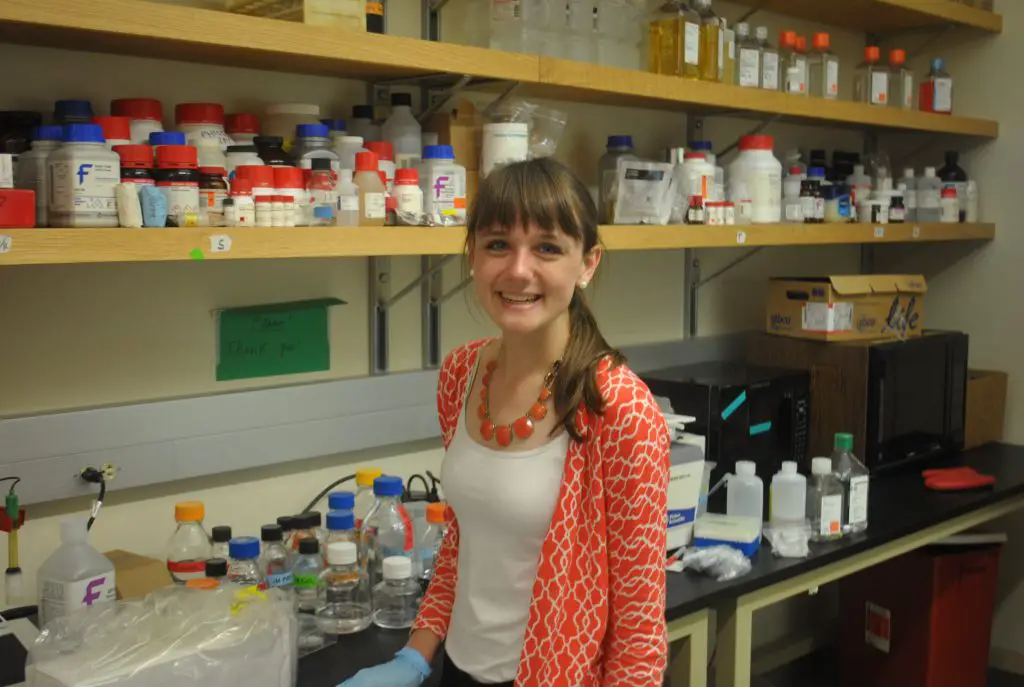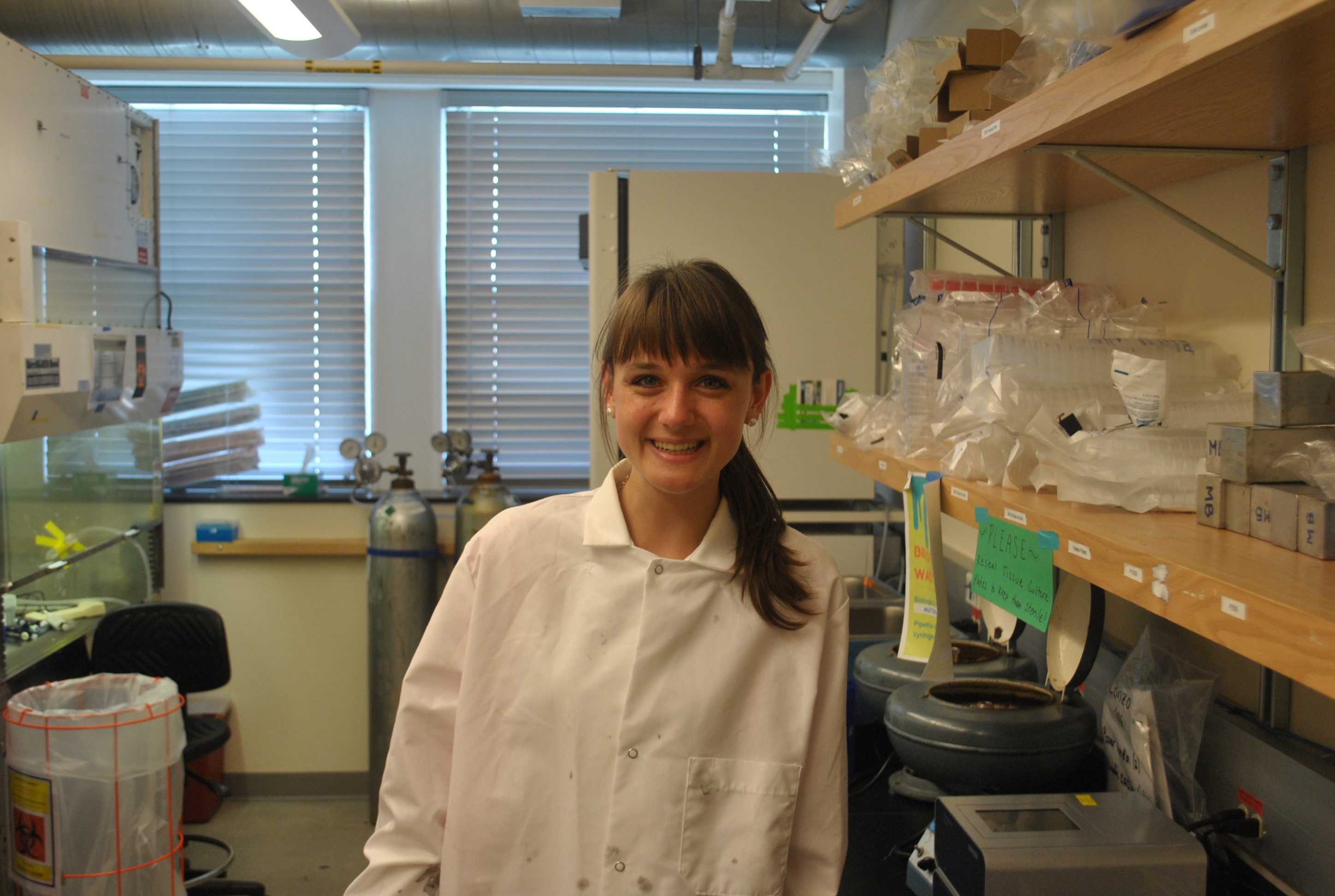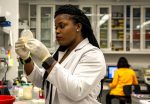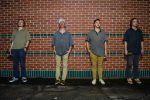Caitlin Seluzicki has been playing the flute for the past eleven years, but her passion for the whimsical instrument didn’t lead her to concert halls and live audiences. Instead, when her middle school band director told her class that playing music was the only activity that could cause multiple people’s brain waves to synchronize, she became obsessed with understanding the impact of music on the brain.
This interest continued until Seluzicki’s junior year of high school in Baltimore, when she had the opportunity to take a pilot independent research course and completed a project she titled “The Impact of Music on the Cognition of Alzheimer’s Patients.” Soon after, she began playing the flute at a memory care unit and was in awe of the impact that live music had on people’s behavior and cognition.
While Seluzicki now majors in Microbiology at Clemson, she has taken care to study a wide breadth of different topics. Last summer she studied medieval literature at the University of Oxford, during which time she learned about the rich history of the scientists who lived and worked there, and during her time at Clemson, Seluzicki has taken courses like “Music and Politics” and “Microbial Diversity and Ecology,” which has allowed her to speak knowledgeably about topics ranging from the impact of Marvin Gaye’s music to the diversity and ecology of microbes in permafrost.
With her varied schedule, broad understanding and fervent appreciation of research and discovery, she became the perfect candidate for not just one, but two prestigious scholarships that gave her national recognition and respect.

Natalie Washuta: You have made quite an impression with your contributions to the scientific community, but everyone has to start somewhere. So, why did you choose to go to Clemson and major in Microbiology?
Caitlin Seluzicki: I chose Clemson because of the university’s focus on involving undergraduates in research. I chose to major in Microbiology because I thought the courses sounded interesting and I enjoy learning about how microbes affect humans in a variety of ways.
NW: At Clemson, you study under David Feliciano, an assistant professor of biological studies. Can you tell me a little bit about the work you do with him specifically? How has Feliciano influenced or impacted your studies?
CS: Turning back time a little bit, I was first introduced to research by Ms. Marjorie Simon, who was my Independent Research Course teacher in high school. She worked tirelessly with me as a junior high school student to show me the proper way to analyze articles and how to obtain the resources I needed to reach my goal. Her guidance and mentoring helped me realize that research might be a career path for me, and a possible career in research was confirmed after joining Dr. Feliciano’s lab at Clemson University.
Now, I have been an undergraduate in Dr. Feliciano’s lab for two-and-half years. My research during that time focused on the role of a specific amino acid transporter involved in cerebral cortical development. We examined the impact of this transporter on development through examinations of its impact on mTOR, Mammalian Target of Rapamycin, an essential pathway in development, and its impact on the morphology of neurons.
NW: You were recently awarded the 2017 Astronaut Scholar Award and are only one of seven Clemson students to ever receive this award. How does it feel to be in such distinguished company?
CS: The Astronaut Scholarship was founded by the Mercury 7 astronauts and is awarded to students planning to pursue research careers in the STEM fields. It focuses on mentoring and providing scholars with resources to enable their success and to promote their roles in being at the leading edge of science and technology.
I am very honored and overjoyed to have received this scholarship, and very thankful to all of my mentors along the way who have helped me. Frankly, I was very surprised to be selected as this year’s recipient. That being said, it is truly an honor. The Astronaut Scholarship is an exciting opportunity to help me continue my development as a scientist. The scholarship has a significant mentoring focus, so I am eager to learn from talented scientists and experts in their field.
NW: With the research you are doing, it is no surprise the Astronaut Scholar Award was not the only accolade you received this year. You have also recently been awarded the 2017 Barry Goldwater Scholarship for your research. What kind of work were you doing that helped you win this award?
CS: I was very honored to receive the Goldwater Scholarship and extremely grateful for all of the mentoring I have received along the way. For those who do not know, the Goldwater Scholarship is awarded to an undergraduate studying in the fields of mathematics, natural sciences and engineering.
The Goldwater application process involved a discussion of research I had been a part of and how I will use that experience to develop a project of my own. I am interested in the role of autophagy [the mechanism that allows a cell to degrade and recycle cellular components that are functioning improperly] in development, so I discussed my ideas about the work I had been a part of and how observations from this work inspired me to pursue research that addresses the question of autophagy’s role in development.
NW: What is the most important thing about research, based on your experience? What do you think the ultimate key to your success was along the way?
CS: I think of research as a way to serve the world while being a part of something that you are passionate about. It is passion that ranks above all else.
I also strongly believe in the researcher’s role in bridging the gap between the scientific community and those without a scientific background in order to sustain support of scientific endeavors. My mentors and family have given me wonderful opportunities, advice and support along the way.
NW: So what’s next? From the extensive work you have done already, it doesn’t seem like you are going to be complacent, even after winning all those scholarships. What are your plans for the summer and the upcoming school year?
CS: I am currently working as a course assistant for the Marine Biological Laboratory Physiology course. The Physiology course at MBL has been running for 125 years and is for post-doctoral and graduate students to collaborate and perform cutting-edge research under well-established faculty members with diverse scientific backgrounds.
The best part about my job is that I am exposed to a variety of research areas and techniques that are only available in a course like the MBL Physiology course since the students come from around the world, with very different scientific backgrounds and expertise. The environment is highly stimulating and energetic, which has altered the way I think about scientific problems.
I’m really young and learning something new every single day. I love research and I am just excited for a lifetime of learning. After graduation, I plan to pursue a graduate program with a focus on translation research. I hope to pursue a combined MD/PhD program or PhD program with my focus on neuroscience research.













